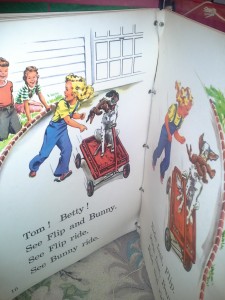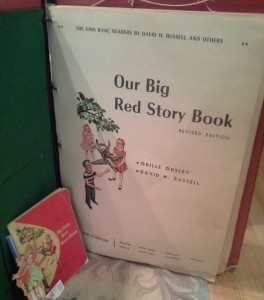
What should kindergarteners know about reading?
Dick and Jane taught a lot of kids how to read, even though not every yard had a pony. We’ve come a long way with rich literature and real life writing. But there is a chasm between what kindergarteners know and Common Core ‘K’ Standard, which may surprise you with its rigorous expectations. There are four major standards in this “strand: “Print Concepts, Phonological Awareness, Phonics and Word Recognition and Fluency“. Phew, a lot for kindergarten.
Kindergarten children are my favorite little learners. First they figure out how the classroom works and how to get along with each other, then learning begins. Kindergarten teachers are unsung heroes and sheroes. Spend a day in kindergarten and you’ll know what I mean. Not all kids coming into kindergarten are ready for challenges above their developmental level and that’s what’s happening. I worry about teachers as much as the kids.
As principal I once told a.m. and p.m. ‘k’ team I would take their classes so they could do extra planning. At that time, kindergarten teachers lived in a very isolated world. Well, that was brave of me- 64 squirrelly kids playing store, with fake food and shopping carts flying around. Since I am a firm believer in learning through play, my plans were shattered and my ego took a trouncing. BUT those two teachers got time together to plan and that’s what it was all about. We are now all in the middle of a different, important collegial conversation, involving many stakeholders.
Children are not cookie cutter kids. One size does not fit all, and class size matters. Of the CSSS ‘K’standards, it makes sense to teach print concepts, of course. Also phonological awareness (sounds of the language). In my opinion, most of the next two levels belong in first grade. Children who didn’t go to preschool may not know how to hold a book or which way the print goes. It may take awhile to teach that sounds make letters, letters make words, etc. That’s why Language Experience still works for these kids. Kindergarten is a time to look for patterns in language and savor the beauty. Policy makers must listen to kindergarten teachers who know best and say good-bye to data driven instruction. Kids drive instruction.
After my principalship, I taught with hundreds of kindergarten teachers throughout the U.S. I observed dedicated teachers in print and language rich environments. Recently in conversations with other teachers, we lamented the loss of rhythm sticks and pianos replaced by too early assessment, high level benchmarks and loss of learning through play.
Kindergarteners should be pre-readers, learning the sounds of the language and corresponding letters. Kindergarteners are not accomplished readers. The pressure is on so fiercely for children to excel at reading, yet many children are not academically or emotionally ready to pour it on.
Kindergarteners are joyous. Thank you to the multitude of teachers keeping the joy of reading as top priority, regardless of obstacles.
Leaving footprints on your reading hearts, Rita
Follow me on Twitter and like me on Facebook!


